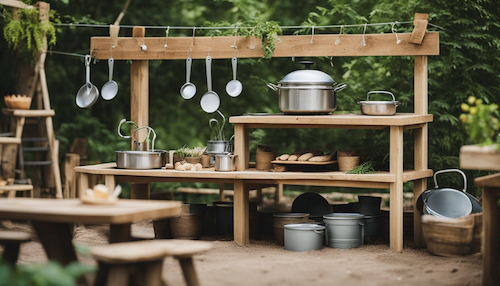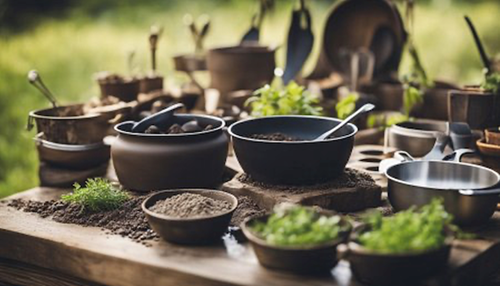How Mud Kitchens Foster Holistic Child Development
Ever witnessed the sheer joy on a child's face as they concoct muddy potions or bake dirt pies, and wondered about the deeper implications of such play? If so, you're not alone. Mud kitchens, though seemingly rudimentary, are potent hubs of multifaceted learning and development.

Fortunately, the humble mud kitchen transcends mere messy play, fostering a plethora of skills that contribute to a child's holistic growth.
I've delved into the myriad ways mud kitchens play a pivotal role in shaping both cognitive and emotional facets of a child's maturation.
Let's unearth the magic behind mud kitchens, revealing the profound impact they have on nurturing well-rounded, resilient, and imaginative children.
Key Takeaways
* Mud kitchens are a fun and engaging way to promote holistic child development.
* They encourage sensory exploration, creative play, and hands-on learning.
* Mud kitchens can help to develop fine motor skills, promote social interaction, and encourage critical thinking and problem-solving.
Understanding Mud Kitchens
If you're not familiar with mud kitchens, they're essentially outdoor play spaces where children can engage in imaginative and sensory play using natural materials like mud, water, and natural objects. Mud kitchens typically include items such as pots, pans, utensils, cups, spoons, and bowls, as well as a table or counter, shelves, storage, hooks, and sometimes a water source or sink.
Mud kitchens are designed to encourage children to explore and interact with the natural world, fostering a sense of wonder, curiosity, and connection to nature. By engaging in sensory play with mud, water, and other natural materials, children can develop their fine motor skills, hand-eye coordination, and creativity. They can also learn about cause and effect, problem-solving, and scientific concepts like states of matter and chemical reactions.
Building a mud kitchen can be a fun and rewarding project for parents, teachers, or caregivers. All you need is some basic woodworking skills and a few materials like plywood, screws, and waterproof paint or sealant. You can also add accessories like herbs, flowers, or stones to enhance the sensory experience.
The Fun and Creativity in Mud Kitchens
Mud kitchens are an excellent way to encourage children to engage in fun and imaginative play. The immersive messy play that is associated with mud kitchen play is a great way to stimulate children's creativity and imagination. Children can create mud pies, soup, and other concoctions using a variety of natural materials such as acorns, stones, flour, and dandelions.
The beauty of mud kitchen play is that it allows children to have complete control over what they are creating. They can mix and match ingredients to create their own unique recipes. This type of imaginative play is essential for children's holistic development as it helps to build their problem-solving skills, creativity, and self-expression.
Roleplay is another important aspect of mud kitchen play. Children can take on different roles such as chef, baker, or restaurant owner, which helps to develop their social skills and confidence. They can also invite their friends to join in the fun, which encourages teamwork and cooperation.
Mud kitchen play is not just limited to mud pies and soup. Children can also create cupcakes, sandwiches, and other tasty treats using natural materials. The possibilities are endless, and it's a great way to get children excited about learning.
Mud kitchen play is not just limited to the backyard. You can set up a mud kitchen in a playground or other outdoor area where children can enjoy messy play without worrying about making a mess indoors.
Mud Kitchens and Child Development
https://www.youtube.com/watch?v=CU8-IvxK0rE&embed=true
Mud kitchens are a fantastic way to foster holistic child development. They offer a hands-on, sensory-rich environment that helps children develop their motor skills, learning abilities, and social skills. Here are some of the key ways in which mud kitchens can support child development:
Sensory Play
Mud kitchens provide an excellent opportunity for children to engage in sensory play. Sensory play helps children learn about the world around them through exploration and experimentation. Playing with mud, water, and other materials in a mud kitchen can help children develop their sense of touch, smell, and sight. It can also help them learn about cause and effect and develop problem-solving skills.
Motor Skills Development
Playing in a mud kitchen can help children develop both their fine motor skills and gross motor skills. Fine motor skills are important for tasks such as writing, drawing, and using utensils. Gross motor skills are important for activities such as running, jumping, and climbing. Mud kitchens offer opportunities for children to practice both types of skills as they scoop, pour, mix, and stir.
Social Skills
Playing in a mud kitchen can also help children develop their social skills. Mud kitchens provide an environment where children can work together, share materials, and communicate with each other. This can help them develop important skills such as cooperation, communication, and empathy.
Language Development
Mud kitchens can also support language development. Children can learn new words as they describe what they are doing, what they are making, and what they are experiencing. They can also practice their communication skills as they interact with other children in the mud kitchen.
Independence and Initiative
Playing in a mud kitchen can also help children develop their independence and initiative. Mud kitchens provide an environment where children can take charge of their own learning and exploration. They can experiment with different materials, try out new ideas, and take risks in a safe and supportive environment.
Math Skills
Mud kitchens can also support the development of math skills. Children can practice measuring, counting, and estimating as they mix ingredients and create recipes. They can also learn about concepts such as volume, weight, and density as they work with different materials in the mud kitchen.

Mud Kitchens and Health Benefits
Playing in a mud kitchen can have various health benefits for children, including boosting their immune system. Exposure to bacteria in the mud can help strengthen the immune system and make it more resilient to illnesses. Playing in the mud can help build immunity and reduce the risk of allergies and asthma.
Mud kitchens can also contribute to the overall wellbeing of children. Playing in the mud can be a stress-relieving activity that helps children relax and unwind. It can also provide a sense of control as children can manipulate the mud and create their own experiences.
Mud kitchens can also help children develop socially and emotionally. Playing with others in the mud kitchen can foster communication, cooperation, and empathy. Children can learn to share tools and materials, take turns, and negotiate roles and responsibilities.
Mud Kitchens and Social Skills
Mud kitchens are not just about getting messy and having fun. They also provide an excellent opportunity for children to develop their social skills. When children play with mud kitchens, they learn how to share and take turns with their peers. This is an essential skill that they will use throughout their lives.
Playing with mud kitchens also helps children learn about families and different roles within them. They can pretend to be a parent, grandparent, or caregiver. This type of role-play helps children understand the different roles that people play in their lives.
Mud kitchens provide a safe and inviting space for children to engage in imaginative play. They can create their own scenarios and act them out with their peers. This type of play helps children develop their communication skills and learn how to work together as a team.
The Sensory Experience of Mud Kitchens
Mud kitchens provide a unique sensory experience for children that stimulates their senses and encourages them to explore the world around them. The different textures of sand, ground, topsoil, and soil in a mud kitchen allow children to touch, feel, and manipulate different materials, which can help to develop their fine motor skills.
The addition of a water supply to the mud kitchen allows children to experiment with wet and dry materials, which further enhances their sensory experience. The combination of different textures and water creates mud, which is perfect for messy play and encourages children to get their hands dirty.
Messy play is an essential part of child development as it allows children to explore and experiment with different materials, which can help to develop their creativity and imagination. The sensory experience of mud kitchens can also help to promote relaxation and reduce stress in children.
Mud kitchens also provide a safe and controlled environment for children to play with mud and water. This can help to prevent accidents and injuries that can occur when children play with these materials unsupervised.